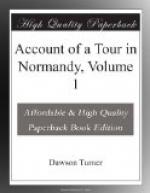In the beginning of the revolution, a much wider door was open: all that was then necessary to entitle a man to vote, was, that he should be twenty-one years of age, a Frenchman, and one who had lived for a year in the country on his own revenue, or on the produce of his labor, and was not in a state of servitude. It was then also decreed, that the electors should have each three livres a day during their mission, and should be allowed at the rate of one livre a league, for the distance from their usual place of residence, to that in which the election of members for their department is held. Such were the only conditions requisite for eligibility, either as elector or deputy; except, indeed, that the citizens in the primary assemblies, and the electors in the electoral assembly, swore that they would maintain liberty and equality, or die rather than violate their oath[48].
The wisdom and prudence of the subsequent alterations, few will be disposed to question: the system, in its present state, appears to me admirably qualified to attain the object in view; and such seems the general character of the French Constitutional Charter, which unites two excellent qualities, great clearness and great brevity. The whole is comprised in seventy-four short articles; and, that no Frenchman may plead ignorance of his rights or his duties, it is usually found prefixed to the almanacks. Some persons might, indeed, be inclined to deem this station as ominous; for, since the revolution began, the frame of the French government has sustained so many alterations, that, considering that several of their constitutions never outlived the current quarter, they may be fairly said to have had a new constitution in each year. How far the Bourbon charter will answer the purpose of serving as the basis of a code of laws for the government of an extensive kingdom, time only can determine. At present, it has the charm of novelty to recommend it; and there are few among us with whom novelty is not a strong attraction. Our friends on this side of the water are greatly belied, if it be not so with them.
The finances of the French municipalities are administered with a degree of fairness and attention, which might put many a body corporate, in a certain island, to the blush. Little is known in England respecting the administration of the French towns: the following particulars relating to the revenue and expences of Rouen, may, therefore, in some measure, serve as a scale, by which you may give a guess at the balance-sheet of cities of greater or lesser magnitude.—The budget amounted for the last year to one million two hundred thousand francs. The proposed items of expenditure must be particularized, and submitted to the Prefect and the Minister of the Interior, before they can be paid. In this sum is comprised the charge for the hospitals, which contain above three thousand persons, including foundlings, and for all the other public institutions, the number and excellence




